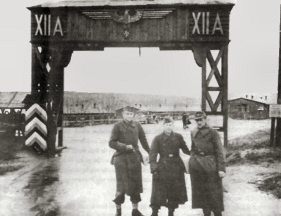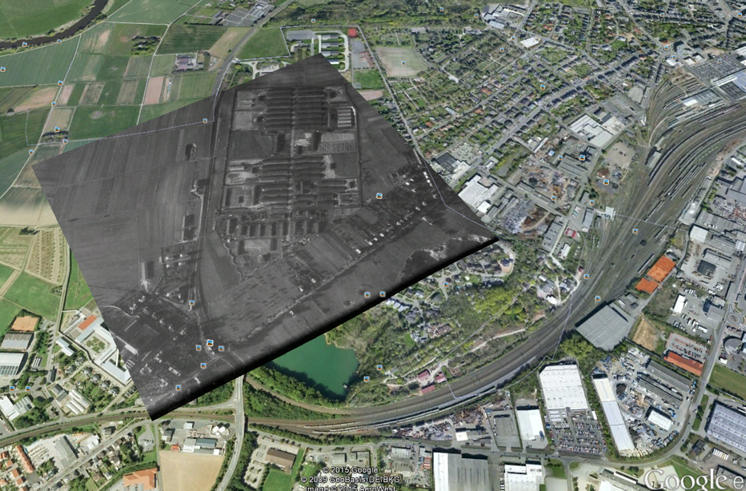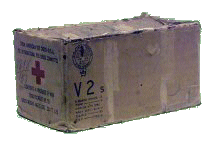by David Thibodeau
I was captured by the Germans Nov. 10, 1944 in the Huertgen Forest, about a month before the famous Battle of the Bulge. The Huertgen Forest battle cost about 36,000 American casualties, but was little talked about.
I arrived at Stalag XII A at Limburg an der Lahn, about 75 miles west of the Belgian frontier, about December 1. Food at XII-A was what was called "grass soup," apparently made up of clippings and waste from cabbage and other vegetables, along with sauerbrot, a dark, nutritious, yeasty-smelling bread. The guys started using bed boards to make fires in the stoves, and the Germans threatened to remove the bunks if it continued. It did continue and the bunks were taken out.

STALAG XII-A at Limburg / Diez

Stalag XII-A, a German prison camp in Limburg, Germany, was the main processing center for US enlisted men and NCO's taken prisoner after D-Day. After IDs were issued, the prisoners were usually sent to other, better organized Stalags deeper inside Germany.
After WWII, all of the buildings from the Stalag XII-A POW camp were removed, and the site is now the German Army post Freiherr-vom-Stein-Kaserne, located midway between Limburg and Diez off the B417.

The camp got overcrowded, so several hundred of us were loaded into freight cars about December 15th to be transferred to another prison camp. The Germans launched the Ardennes counterattack Dec. 16, so maybe they figured on needing space for more prisoners. The fact is they did, as the 106th Infantry Division was overrun and surrendered by battalions in that "Battle of the Bulge."
There must have been 80 to 100 of us in each car. European freight cars are much smaller than the US standard size, and we were badly crowded. There was no straw on the floor, so a towel we got from the Red Cross served as a cushion for our aching hips and alternately as a pillow. There was no heat in the cars except body heat.
We were enroute for about 4-5 days. There were no sanitary provisions nor rest stops, so some of the men began to urinate against the sliding doors or the walls of the car, bringing angry curses from the men pressed up like sardines against the walls and doors.
Each night the doors would slide open and the Germans would throw in several loaves of bread. A regular battle royal would erupt in the darkness as the men tried to get something to eat. A big guy from Minnesota named "Slim" was a sort of captain for a little band I was part of, and he would return with a couple of fist-fuls of bread he ripped out during the melee. The Germans gave us no water, however, so our appetites declined as we got dehydrated. Some of the guys scraped pitiful amounts of snow from cracks in the walls of the car.
We spent a lot of time on sidetracks, as POW trains had no priority. We were parked once on a sidetrack and some American P-38 fighters circled to look us over. We could see them through the cracks, and I saw one peel off to do a strafing run on our train. The 20 mm cannon of the P-38 made a terrific racket as he swept over the helpless string of cars. A German quad- 40 mm anti-aircraft gun opened up on him, however, and he and his friends decided to leave us alone. I was hoping the Germans were good shots.
We reached our new camp, Kriegsgefangenenstalag IV-B about December 20, with seven dead guys aboard the train. Stalag IV-B, however, seemed like a regular land of Oz compared to life in the freight car. We were fed twice a day on bread and soup, and we even had a windup phonograph donated by the Red Cross, and a record of "White Christmas" sung by Bing Crosby. The barracks had straw on the floor, there was some wood for the fire, and we were issued special postcards by the Germans to write home. The camp was about 50 miles north of the Czech border near a town named Muhlberg. We heard from some new arrivals in a day or two that Stalag XII-A, where we had come from, had been bombed by the Americans with over 100 American officers killed.
So we had a pretty nice Christmas, and we sang carols Christmas Eve. We began to think we had a good chance to live to see our families and our homes again. We got Red Cross food parcels to divide up among about six men.

There are endless stories that came out of World War I and World War II from soldiers complaining that the Red Cross overseas charged them for doughnuts. The Red Cross parcels sent to these German camps kept hundreds of thousands of Allied prisoners alive. The parcels contained precious canned meats, butter, chocolate, and other concentrated foods. We usually got a parcel about twice a month.
Stalag IV-B was a temporary stop for prisoners who were sent out from there on labor Kommandos in factories. We stayed a month, however, as we were quarantined because someone came down with cholera.
There were reported to be 20,000 dead Russian prisoners Buried there, as the Germans let them die of starvation in the early stages of the war.

